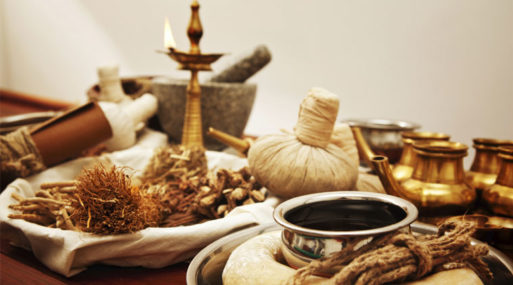
Credit: indianexpress.com
As a student at the California College of Ayurveda, Renee Traub wrote a paper investigating death and dying through an Ayurvedic lens. She brought to her Ayurvedic studies 28 years of experience as a neonatal ICU nurse and three of years of experience as a hospice nurse, so her perspective is rooted in a great deal of first hand experience in aiding people through the dying process. The aim of Traub’s research was to assist those in the end-of-life care-giving field to, “spiritualize the death process for themselves” in order to help dying people and their loved ones approach the process of dying in a more spiritual way.
Ayurveda is a traditional Indian system of medicine based on the belief that mind, body and spirit are inextricably connected. It aims to bring balance to physical, mental and spiritual aspects of life through practices such as meditation, diet, breathing techniques, spirituality, psychology, herbal medicine and detoxification (pancha karma).
In Ayurvedic medicine, the term dosha refers to the three energies that circulate in the body and govern an individual’s unique physical and mental constitution. Renee Traub uses her understanding of doshas as a lens for evaluating how to address the dying process with different individuals.

Credit: livescience.com
Traub’s paper discusses the various doshas in detail, and describes how individuals with an imbalance in doshic energy might react to the process of dying. For example, “vata” energy reflects the elements of space and air, and people with excess vata tend to be fragile, nervous and afraid. When they are dying, these people may show signs of “terminal agitation,” or unpredictable behavior such as emotional outbursts, non-responsiveness or talking to those who have already died.
Vata is also associated with decay, and many bodily changes that occur while a person is actively dying, such as change in smell, unstable body temperature, mottling of the skin the so-called “death rattle” are all symptoms of disruptions in vata, Traub explains. She recommends calming vata with peaceful touch and sound and calming, grounding exercises.
Traub’s paper discusses a number of Ayurvedic tools that can assist families and hospice care-givers in end-of-life work. She writes of the benefits of aromatherapy and advocates the use of high-quality essential oils in calming the nervous system and refreshing the spirit. She suggests using coriander, pine and helichrysum to soften the grieving process, and rosemary, patchouli, cardamom and wintergreen to alleviate depression. She says that aromatherapy awakens higher levels of consciousness, thus making the process of death more spiritual for the dying person, his caregivers and his loved ones.
The sense of hearing is particularly important, as it is the first sense that develops in utero and generally the last sense to go as people transition into death.
Traub also discusses other therapeutic practices that help integrate the senses and create harmony and balance during the process of dying. For example, massage (touch therapy), color therapy, and breathing techniques can be used to comfort patients in hospice as well as their families and caregivers. The sense of hearing is particularly important, as it is the first sense that develops in utero and generally the last sense to go as people transition into death. For this reason, practices that work with sound, such as mantras and music, are particularly potent tools in creating a shift in consciousness and mood.

 Ayurvedic Perspectives on Death and Dying
Ayurvedic Perspectives on Death and Dying


 Our Monthly Tip: Make an “In Case of Death” File to Ease Loved One’s Grief
Our Monthly Tip: Make an “In Case of Death” File to Ease Loved One’s Grief

















That was really great to read came to know the meaning of Doshas after reading this. Keep wriring more.
Report this comment
Amazing to read!! I’ve spent my time really good in reading this. Thank you so much.
Report this comment
Thanks for the tips!
Very Very useful and well informed. I hope I will write like you someday. Keep writing.
Report this comment
I am doing research in “KAYAKALPA” and going to start a hospital with 100 beds for people who wants to live above 120 yerars. My sponsors are from gulf and europier countries.
Report this comment